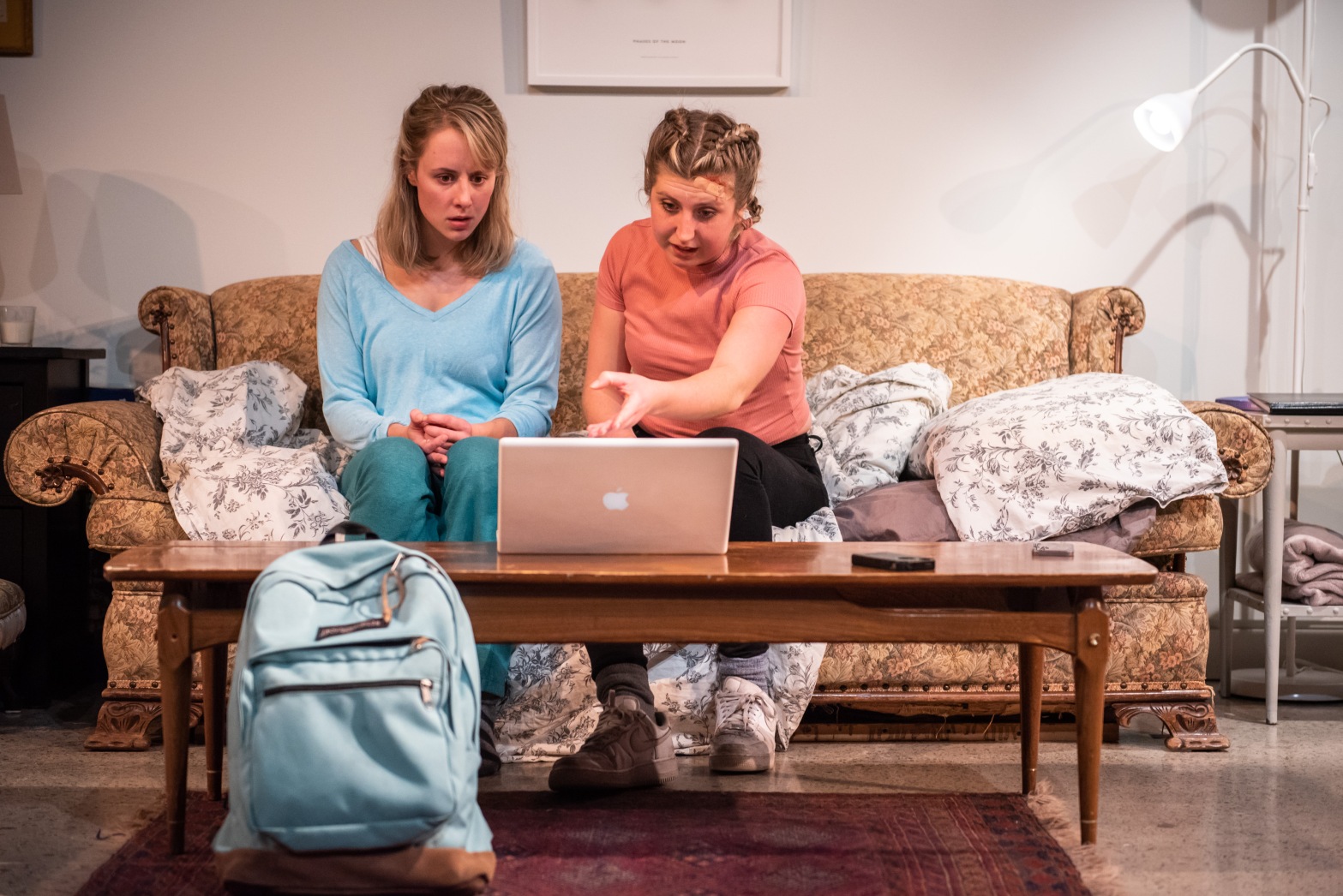Charlie Gould & Ellie Ellwand. Lighting design by Imogen Wilson. Photo by Dahlia Katz.
In Association—which led a sold-out production of Ellie Moon’s Asking For It last season—partners with Crow’s Theatre once again, this time with the world premiere of Moon’s intimate, intense and complex What I Call Her, directed by Sarah Kitz and opening to a sold-out house at Streetcar Crowsnest last night. Exploring a family dynamic of abuse, estrangement, grief and reconciliation, What I Call Her gives us the messy—ultimately human—blacks, whites and greys of family relationships shaped by trauma, conflicting memory and divergent lived experiences.
Estranged from her mother and younger sister Ruby, and recovering from childhood abuse at the hands of her mother, English MA student/writer Kate (Charlie Gould) now finds herself navigating the myriad mixed emotions of her mother’s impending death. Triggered by her mother’s distant death bed, as well as her mother’s startlingly contrasting history of abuse, abusive behaviour and philanthropy for survivors, Kate starts writing a frank obituary for her mother. Her supportive, live-in boyfriend and women’s ally Kyle (Michael Ayres) acts as her anchor, sounding board and Devil’s advocate on the idea of posting it on Facebook.
When Ruby (Ellie Ellwand) surprises them with a late-night arrival at their apartment, the family conflict—in particular, Ruby’s contradictory and hugely different experiences of childhood and their parents—gets too close to home. While Ruby’s appearance sparks Kate’s rage over the family’s denial of her experience, she’s got some anger to unpack as well; and the sisters face-off over their shared history and their mother’s desire for a death bed reunion and subsequent redemption.
The finely-tuned three-hander cast of What I Call Her plays out the various levels of family conflict in a series of contrasts—in moments of quiet and explosion, trauma and comfort, remembering and forgetting—turning the blacks and whites of family history, memory and corresponding emotional/psychological responses into complex, messy and profoundly human shades of grey.
Gould’s broken, neurotic, sharply intelligent Kate can be self-involved, but also self-aware; and Kate’s self-professed knack for hyperbole is matched only by her lonely, hopeless sense of familial gaslighting. As Ruby, Ellwand is both adult and baby sister; brutally honest and perceptive, but needing support and validation. While Ruby’s directness with Kate tends toward cruelty, she desperately needs Kate right now. And Aryes’ Michael is that sweet, #MeToo woke good guy you want to see your sister with. Michael’s calm, quiet demeanour is a perfect foil to Kate’s mercurial outbursts of emotional activity—but, caught in the middle of and pushed away from this family war, and exhausted from keeping Kate from spinning off, even he can only take so much.
It’s especially noteworthy that Kate and Ruby’s mom, who is a fourth but unseen character in this piece, has a history of family abuse—both she and her own mother are survivors. And while it’s no excuse for her verbal and physical abuse of Kate, it’s a reason. The Kates of the world need be able to tell their stories; and as contradictory to the experiences of other family members and painful as these stories may be, they need to come out so real reconciliation and redemption can begin.
What I Call Her continues at Streetcar Crowsnest until December 8; advance tickets are available online. It’s an intimate venue and the show is getting a lot of well-deserved buzz, so booking ahead is strongly recommended.


One thought on “Portrait of a family in messy, human shades of grey in the intimate, intense, complex What I Call Her”